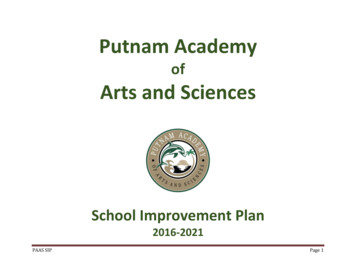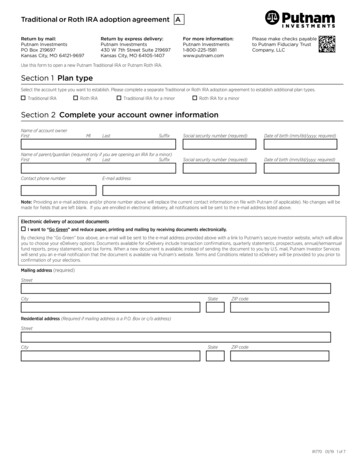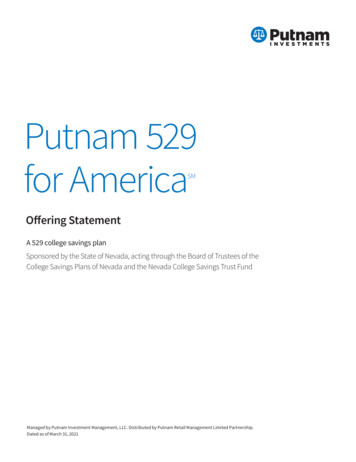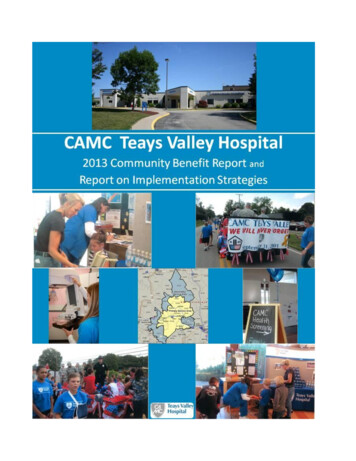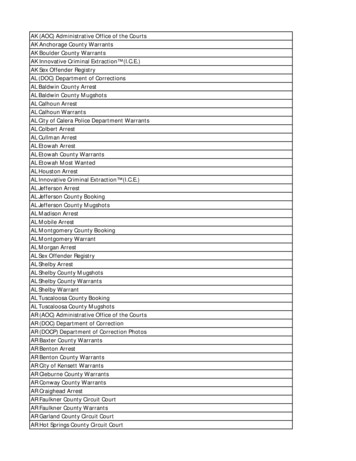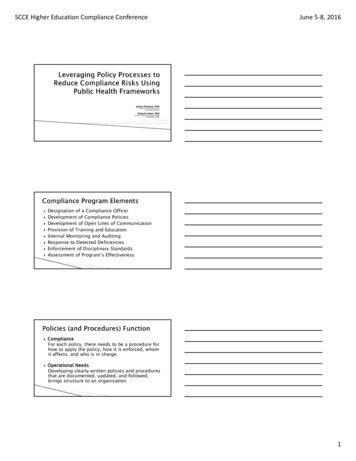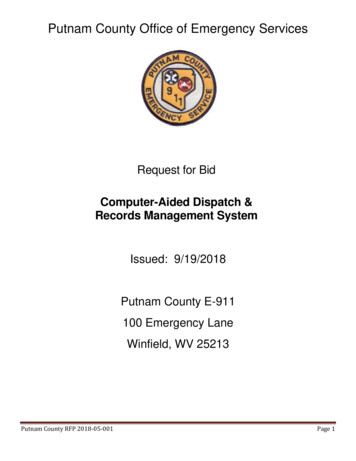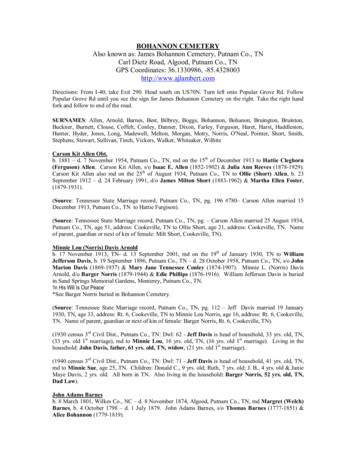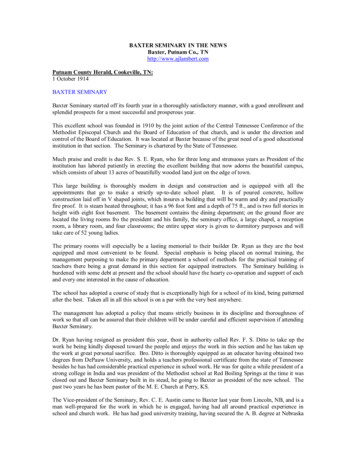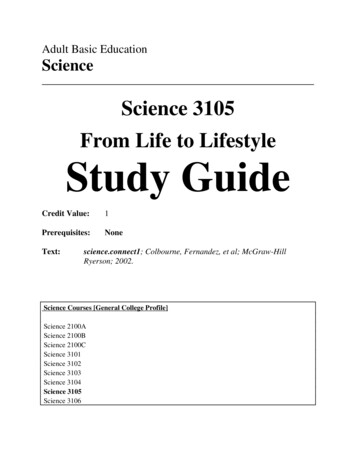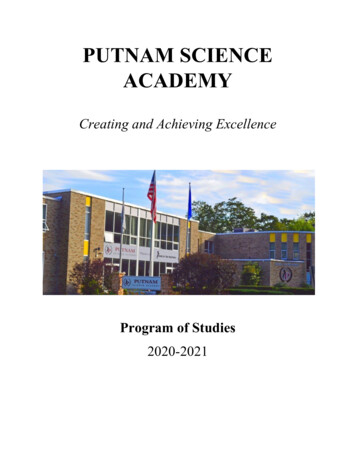
Transcription
PUTNAM SCIENCEACADEMYCreating and Achieving ExcellenceProgram of Studies2020-2021
2TABLE OF CONTENTSINTRODUCTION . 3GRADUATION AND GRADING POLICY .5ENGLISH/LANGUAGE ARTS COURSES . 8MATHEMATICS COURSES . 15SCIENCE COURSES . 20SOCIAL STUDIES COURSES . 27WORLD LANGUAGE COURSES . . 39COMPUTER SCIENCE AND TECHNOLOGY COURSES . 43VISUAL AND PERFORMING ARTS COURSES . 48MUSIC COURSES . 53PHYSICAL EDUCATION AND HEALTH COURSES .54NON-TRADITIONAL ACADEMIC PROGRAMS/PERSONALIZED LEARNING OPPORTUNITIES . . 56Note:Traditionally, Putnam Science Academy offers a comprehensive program of studies. Finaldecisions regarding the actual offering of any particular course for the upcoming school year willdepend upon enrollment and budget constraints. Therefore, not all courses listed in this catalogare guaranteed to run every school year.
3INTRODUCTIONThis catalog is a reference manual for students, parents, and faculty at Putnam Science Academy.It is a complete guide to the possible course offerings at Putnam Science Academy. Eachdepartment has described its specific course offerings, highlighting the main components of eachcourse as well as the prerequisites, which must be met for the course enrollment.Planning an individual student's high school program of studies requires a good communicationbetween the students, parents, and school. The courses at Putnam Science Academy providestudents with many opportunities to meet their educational needs. Beyond state, district, collegeand career requirements, the students are encouraged to select courses that will be academicallystimulating and personally enriching. The aspirations, achievements, and abilities of the studentshould determine the program of studies that he or she pursues in high school.College Bound Athletes:Special attention is put on college bound athletes before they even step foot in Putnam ScienceAcademy doors. As College Counselors, we cross reference all incoming transcripts with theNCAA list of approved courses. The following are Putnam Science Academy NCAA approvedcourses:AMERICAN LITERATURE - COLLEGEAMERICAN LITERATURE - HONORSAP/ENGLISH 3 LANG & COMPAP/ENGLISH 4 LIT & COMPBRITISH LITERATURE - COLLEGEBRITISH LITERATURE - HONORSCREATIVE WRITING & COMPOSITION- COLLEGECREATIVE WRITING & COMPOSITION- HONORSINTRODUCTION TO LITERATURE COLLEGEINTRODUCTION TO LITERATURE HONORSWORLD LITERATURE - COLLEGEWORLD LITERATURE - HONORSADVANCED PLACEMENT WORLDHISTORYAP/EUROPEAN LOGYAP/US GOVERNMENT & POLITICSAP/US HISTORYCIVIL RIGHTSCOLLEGE WORLD HISTORY SINCE1945CURRENT ISSUESECONOMICSEUROPEAN HISTORYGOVERNMENTHONORS SOCIAL SCIENCEINTRODUCTORY COLLEGE UNITEDSTATES HISTORYMODERN WORLD HISTORY - HONORSPSYCHOLOGYUNITED STATES HISTORYUS HISTORYWORLD HISTORY 1WORLD HISTORY 2ADVANCED PLACEMENT STATISTICSALGEBRA & TRIGALGEBRA 1ALGEBRA 2AP/CALCULUS ABAP/CALCULUS BCCALCULUSGEOMETRY
4H/CALCULUSPRECALCULUSSTATISTICSSTATISTICS & DISCRETE MATHTRIGONOMETRY & FUNCTIONSANATOMY & PHYSIOLOGYAP BIOLOGY 2AP PHYSICS 1AP/CHEMISTRY 2AP/PHYSICS 2BIOLOGYCHEMISTRYENVIRONMENTAL SCIENCEINTEGRATED SCIENCEPHYSICAL SCIENCEPHYSICSAP/FRENCH 5 LANG & CULTAP/MANDARIN 5 LANG & CULTAP/SPANISH 5 LANG & CULTFRENCH IFRENCH IIFRENCH IIIH/FRENCH 4H/MANDARIN 4H/RUSSIAN 4H/SPANISH 4MANDARIN 1MANDARIN 2MANDARIN 3RUSSIAN 1RUSSIAN 2RUSSIAN 3SPANISH ISPANISH IISPANISH III
5GRADUATION AND GRADING POLICYGraduation Requirements:Putnam Science Academy offers a College Prep School to students who satisfactorily meetgraduation requirements. Post graduate students who complete program requirements are issueda completion certificate.To participate in graduation exercises, Putnam Science Academy students must earn a minimumof 24 credits in grades 9-12, and must include the following credit distribution:Diploma Credit/Distribution Requirements:EnglishMathematicsScience (w/Lab)Social StudiesWorld LanguageElectives (comp/art/PE/etc)433329College Entrance Requirements:Minimum graduation requirements should not be confused with college/university admissionrequirements. The general rule of thumb for most four-year colleges/universities is thatapplicants should have completed a minimum of 4 units in English, 3 units in math, science,social studies, and world languages while top colleges recommend a minimum of 20 units, 4units in each subject. (Academic units are considered to be full year courses in collegepreparatory courses in English, math, science, social studies, and world languages.)GPA Calculation: Weighted GPA:Putnam Science Academy weights the courses to calculate the grade point average (GPA).GPA is calculated internally by using the following GPA scales:AP Course:Honor Course:College Prep Course:5.04.54.0
6GPA Calculation: Class Rank Policy:Students who transfer in from another school must have been a student at Putnam ScienceAcademy for at least two school years to be considered eligible for the honors of valedictorianand salutatorian upon completion of their senior year.Grading Scale:Letter GradeA AAB BBC CCD DDFRange96 - 10093 - 9590 - 9286 - 8983 - 8580 - 8276 - 7973 - 7570 - 7266 - 6963 - 6560 - 620 - ant Scheduling Deadlines:1. Changing courses after the academic year has started can often be very disruptive to astudent’s schedule. Thus, elective course changes will not be permitted if they interfere withacademic courses already scheduled.2. Adding classes/Dropping classes: Remember, all students must maintain a minimum courseload of 7 credits per year. Last day to add/drop a first semester class or a year long course: By the third Friday ofthe first quarter. Last day to add/drop a second semester class: By the third Friday of the third quarter.Note: Under special circumstances, such as a teacher’s dissatisfaction with the student, theadministration has the right to drop a student from a year long course at the end of the firstquarter.3. A student who withdraws from any course prior to the above deadlines will be removed fromthe class roster and no record of this withdrawal will appear on the student’s permanent record.A withdrawal after the deadline will receive a record of Withdraw Pass (WP) or Withdraw Fail(WF) on the student’s permanent transcript.
74. A student taking a college course should ask the college to send a transcript to the CollegeCounseling Office at Putnam Science Academy if the student would like the course to be shownat Putnam Science’s transcript.Instructional Levels:Courses at Putnam Science Academy may be offered in four different levels of difficulty andsophistication. They are appropriately designed for students who have demonstratedcorresponding levels of achievement, performance, and interest.College PrepCurricula designed to intellectually challenge and continue the academic development of themajority of students who have made satisfactory progress to date, through our collegepreparatory curriculum.HonorsRigorous honors curricula that move at an accelerated pace through the course material andinclude especially challenging reading and writing assignments. These courses are designed forstudents who have demonstrated excellent proficiency in reading and writing, who can work wellwith abstract ideas, and who reliably and independently manage a challenging academicworkload.Advanced PlacementAdvanced Placement (AP) courses are an opportunity for students to take college level classeswhile completing their high school career. AP classes are extremely demanding. Students shouldonly take these classes if they demonstrate college level skills in reading and writing, as well ashave a commitment to do hard work with a desire to understand and discuss difficult concepts.Students who take the course must also take and pass an exam. Upon earning a passing examgrade, the course may be considered for college credit.
8ENGLISH/LANGUAGE ARTS COURSESIntroduction:The English Program has a strong focus on composition and literature while instilling intelligenthabits of speaking and listening. Our first concern in composition is to assist students in writinghonestly and developing styles with authentic voice. Emphasis is placed on personal, technical,and analytical forms of writing as well as those skills necessary to enhance our scientificcurricula.Literary analysis is a major concentration with special attention to meaningful, personalinvolvement with the literature. Our curriculum is designed to acquaint each student with someof the major cultural and aesthetic movements of American Literature and British Literature,giving attention to the voices of women, minorities, and non-western writers. See the followingchart for the typical sequence of courses.Introduction to Literature - CollegeCredits: 1Prerequisite: Completion of eighth grade English and reading at, or above grade level.Description: This course builds upon students’ prior knowledge of grammar, vocabulary, wordusage, and the mechanics of writing and usually include the four aspects of language use:reading, writing, speaking, and listening. This course introduces and defines various genres ofliterature, with writing exercises often linked to reading selections. Emphasis is placed onstrengthening needed vocabulary, grammar, and writing skills. The completion of frequentwriting assignments is an expectation. Literature is an important component; therefore, studentsshould expect a substantial amount of reading. They will be exposed to the genres of mythology,classical literature, and contemporary fiction. Romeo and Juliet, Lord of the Flies, The Odyssey,and Of Mice and Men may be among the titles chosen. In addition to these readings, ananthology will be utilized. A formal research project will be assigned.Introduction to Literature - HonorsCredits: 1Prerequisite: At least a grade of B in eighth grade English and reading above grade levelDescription: This course builds upon students’ prior knowledge of grammar, vocabulary, wordusage, and the mechanics of writing and usually include the four aspects of language use:reading, writing, speaking, and listening. This course introduces and defines various genres ofliterature, with writing exercises often linked to reading selections. This course concentrates itsstudy on the major literary forms, vocabulary development, and grammar. The literary emphasisis placed on analysis of the form, content, and style of the short story. Other major genresconsidered in detail are the epic, novel, and drama. Works studies may include The Odyssey,Great Expectations, Tale of Two Cities. Maus I and Maus II, Of Mice and Men, A Separate
9Peace, Lord of the Flies, and Romeo and Juliet. Etymology supplements the formal study ofcollege-level works and those reflected from literature in the development of vocabulary skills.Grammar is taught formally, on an individualized basis, and through various writingassignments. Special emphasis is placed on phrases, causal relationship, sentence structure, andstudy skills. The writing of formal research papers will be addressed. Before entering this course,parents and students should carefully consider the recommendation of the teacher and thedepartment head.World Literature - CollegeCredits: 1Prerequisite: Successful completion of Introduction to Literature or administrative/teacherapprovalDescription: This course offers a balanced focus on composition and literature. Typically,students learn about the alternate aims and audiences of written compositions by writingpersuasive, critical, and creative multi-paragraph essays and compositions. Through the study ofvarious genres of literature, students can improve their reading rate and comprehension anddevelop the skills to determine the author’s intent and theme and to recognize the techniquesused by the author to deliver his or her message. World Literature uses representative literatureselections from ancient and/or modern times from countries around the world. Students improvetheir critical-thinking skills as they comprehend the diversity of literary traditions and theinfluences of those traditions. Oral discussion is an integral part of literature courses, and writtencompositions are often required. Literature studied may include such titles as Oedipus Rex, Lordof the Flies, Of Mice and Men, The Glass Menagerie, and Julius Caesar.World Literature - HonorsCredits: 1Prerequisite: At least B- in Honors Introduction to Literature or at least A- in Introduction toLiterature course and administrative/teacher approval.Description: World Literature course uses representative literature selections from ancientand/or modern times from countries around the world. Students improve their critical-thinkingskills as they comprehend the diversity of literary traditions and the influences of thosetraditions. Oral discussion is an integral part of literature courses, and written compositions areoften required. Since Honors World Lit. represents the last molding stage of student growth inlanguage skills (i.e. grammar, sentence structure, composition, vocabulary, reading, and otherrelated areas), the curriculum is carefully developed in an effort to prepare students to meet themore in depth requirements of high school English. There is a heavy focus on literary analysis,and students will read widely and deeply. Numerous genres are taught, including drama, shortstories, non-fiction, novels, and poetry. Works studied may include Animal Farm, To Kill aMockingbird, 1984, and Julius Caesar. There is a heavy emphasis on writing, therefore studentsshould enter this course with strong writing skills intact. Written research projects, essays, andoral presentations are requirements.
10American Literature - CollegeCredits: 1Prerequisite: Successful completion of World Literature or administrative/teacher approvalDescription: This course continues to develop students’ writing skills, emphasizing clear,logical writing patterns, word choice, and usage, as students write essays and begin to learn thetechniques of writing research papers. Students continue to read works of literature, which oftenform the backbone of the writing assignments. Literary conventions and stylistic devices mayreceive greater emphasis than in previous courses. American Literature course focuses uponcommonly known American authors and their work. These may include Hemingway, Miller,Poe, and O’Neill. There will be continuous emphasis on vocabulary building as a corollary to thereading. Writing projects will be designed to strengthen students’ communication skills. Thestudent selecting this course will have a very good background in American Literature and in themechanics of grammar and writing. Students improve their critical-thinking skills as theydetermine the underlying assumptions and values within the selected works and as theyunderstand how the literature reflects the society of the time. Oral discussion is an integral partof literature courses, and written compositions are often required.American Literature - HonorsCredits: 1Prerequisite: At least B- in Honors World Literature or at least A- in World Literature courseand administrative/teacher approval.Description: Honors American Literature opens through the familiarization with the mainliterary genres and progresses through the study of significant works of American Literary Art. Astudy of American Literature parallels and enhances the study of U.S. History. Literary worksstudied are also viewed imaginatively and related to immediate experience. In essence, studentstaking Honors American Literature are exposed to and urged to express the American literaryspirit. Subtext and critical thinking skills are addressed and an emphasis is put on obtaining anunderstanding of how to apply what students have learned. The class also focuses on expressionand the creative process, understanding how to turn your thoughts into words on a page. Avariety of mediums are addressed including, short story, play and poetry writing. Major worksthat are covered include: The Crucible, Fahrenheit 451, The Catcher in the Rye, The ThingsThey Carried, The Great Gatsby, Scarlet Letter and others as well as a vast assortment of classicAmerican short stories and poetry. Students improve their critical-thinking skills as theydetermine the underlying assumptions and values within the selected works and as theyunderstand how the literature reflects the society of the time. Oral discussion is an integral partof literature courses, and written compositions are often required.
11British Literature - CollegeCredits: 1Prerequisite: Successful completion of American Literature or administrative/teacher approvalDescription: This course blends composition and literature into a cohesive whole as studentswrite critical and comparative analyses of selected literature, continuing to develop theirlanguage arts skills. Typically, students primarily write multi-paragraph essays, but they mayalso write one or more major research papers. British Literature will study the works ofcelebrated British authors, such as Chaucer, Shakespeare, Keats, Shelley, Yeats, Swift, Wilde,Orwell, the Bronte sisters, etc. Societal influences on their writing will also be examined. Oraland written presentations will be an integral part of this course. The study of grammar will arisefrom needs identified in student’s’ written work. The student selecting this course will have avery good background in British Literature, the mechanics of grammar, and writing. The classwill cover British Literature from the Anglo-Saxon period up to contemporary works. Studentsare provided with the contextual history of each literary period and work so that they may makethe connections between the works and the times in which they were written.British Literature - HonorsCredits: 1Prerequisite: At least B- in Honors American Literature or at least A- in American Literaturecourse and administrative/teacher approval.Description: This course is a challenging study of British Literature. This course blendscomposition and literature into a cohesive whole as students write critical and comparativeanalyses of selected literature, continuing to develop their language arts skills. Typically,students primarily write multi-paragraph essays, but they may also write one or more majorresearch papers. The class shall approach the works chronologically and consider the influenceof the evolving British culture on language, discourse, and literary styles. Students will studyworks by Chaucer, Shakespeare, Blake, Keats, Shelley, Milton, Swift, Wilde, and Huxley.Reporting orally and writing will be integral parts of this course. Additionally, grammar shall beaddressed through the needs identified in student writing. Students taking this course need to becapable of maintaining intensive reading and writing projects as well as have the capacity todeliver well developed oratories. This class cover British Literature from the Anglo-Saxonperiod up to contemporary works. Students are provided with the contextual history of eachliterary period and work so that they may make the connections between the works and the timesin which they were written. A heavy focus is placed on student’s abilities to understand thesubtext of various works and how these works fit into history both in the time they were writtenand today. Critical thinking skills are also a key to this classroom and students are constantlychallenged to find characters motivations and the reasons behind why certain themes exist. Keyworks in the class include: Beowulf, The Canterbury Tales, Hamlet, Frankenstein, Brave NewWorld and Dracula. Other material includes excerpts from Paradise Lost, Gulliver’s travels and awide assortment of British poetry.
12AP/ English 3 Language & CompositionCredits: 1Prerequisite: Successful completion of Honors World Literature, with at least a grade of a B andteacher/administrative approval.Description: Following the College Board’s suggested curriculum designed to parallelcollege-level English courses, AP English Language and Composition course exposes students toprose written in a variety of periods, disciplines, and rhetorical contexts. This course will providestudents with workload challenges consistent with an undergraduate English composition course.This courses emphasizes the interaction of authorial purpose, intended audience, and the subjectat hand, and through them, students learn to develop stylistic flexibility as they writecompositions covering a variety of subjects that are intended for various purposes. Studentsentering AP English are already skilled in basic composition, and are proficient in their use ofstandard English grammar and mechanics. Expected in this course is refinement of these skills todevelop sophistication and stylistic maturity in writing. Focus is on a variety of writing genres,particularly the synthesis, argumentative, and analytical essay. There is also a heavy focus on thestudy of rhetoric, defined as the art of discourse, an art that aims to improve the facility ofspeakers and writers. The course emphasizes critical reading of various prose styles, with aheavy emphasis on nonfiction. This is a yearlong course, which is designed to prepare studentsfor the Advanced Placement Exam given in May.AP/English 4 Literature & CompositionCredits: 1Prerequisite: Successful completion of Honors American Literature, with at least a grade of a Band teacher/administrative approval.Description: Following the College Board’s suggested curriculum designed to parallelcollege-level English courses, AP English Literature and Composition courses enable students todevelop critical standards for evaluating literature. Students study the language, character, action,and theme in works of recognized literary merit; enrich their understanding of connotation,metaphor, irony, syntax, and tone; and write compositions of their own (including literaryanalysis, exposition, argument, narrative, and creative writing). An AP course in EnglishLanguage and Composition engages students in becoming skilled readers of prose written in avariety of rhetorical contexts, and in becoming skilled writers who compose for a variety ofpurposes. Both their writing and their reading should make students aware of the interactionsamong a writer’s purposes, audience expectations, and subjects, as well as the way genreconventions and the resources of language contribute to effectiveness in writing. This is ayearlong course, which is designed to prepare students for the Advanced Placement Exam givenin May.
13Film StudiesCredits: 1Prerequisite: B- or higher in a prior English Literature courseDescription: This course will serve as an introduction to film appreciation and production.Students will view a selection of films and analyze the aesthetic elements includingcinematography, editing, sound, script, acting, direction, and mise en scene. In addition, studentsconsider the context in which a film was created, and how elements such as cultural roles, genre,political issues, economics, ethics, and history influenced the film. Students will engage inanalysis and actively participate in class discussion.In addition they will engage in writingcritical reviews, and conducting research. Students will create at least one short film of theirown.Writing CompositionCredits: 1Prerequisite: B- or higher in a prior English Literature course and teacher recommendationDescription: This course focuses on students’ writing skills and develop their ability to composedifferent types of papers for a range of purposes and audiences. Writing Composition courseenables students to explore and practice descriptive, narrative, persuasive, or expository styles asthey write paragraphs, essays, letters, applications, formal documented papers, or technicalreports. Although composition courses may present some opportunities for creative writing, theirfocus usually remains on nonfiction, scholarly, or formal writing.Public SpeakingCredits: 1Prerequisite: B- or higher in a prior English Literature courseDescription: Public Speaking course enables students, through practice, to developcommunication skills that can be used in a variety of speaking situations (such as small and largegroup discussions, delivery of lectures or speeches in front of audiences, and so on). Coursetopics may include (but are not limited to) research and organization, writing for verbal delivery,stylistic choices, visual and presentation skills, analysis and critique, and development ofself-confidence. Students will also listen to speeches and experiment with different styles,rhythms, and formats. Oral presentations and written work are required on a weekly basis.Students will learn and gain skills to speak confidently and convincingly in a public.
14Creative Writing and Composition - CollegeCredits: 1Prerequisite: B- or higher in a prior English Literature course and teacher/admin approvalDescription: Creative Writing course offers students the opportunity to develop and improvetheir technique and individual style in poetry, short story, drama, essays, and other forms ofprose. The emphasis of the courses is on writing; however, students may study exemplaryrepresentations and authors to obtain a fuller appreciation of the form and craft. Although thiscourse mostly covers several expressive forms, classes will sometimes concentrate on particularform such as poetry or playwriting.JournalismCredits: 1Prerequisite: B- or higher in a prior English Literature course and teacher/admin approvalDescription: Journalism course is usually associated with the production of a school newspaper,yearbook, or literary magazine and emphasizes writing style and technique as well as productionvalues and organization. Journalism course introduces students to the concepts ofnewsworthiness and press responsibility; develop students’ skills in writing and editing stories,headlines, and captions; and teach students the principles of production design, layout, andprinting. Photography and photojournalism skills may be included.
15MATHEMATICS COURSESIntroduction:The purpose of the Mathematics Department is to provide a sound, contemporary, andcomprehensive mathematics curriculum that offers each student an opportunity to realize hispotential as a critical and logical thinker. The department strives to provide experiences thatstress the concepts and skills necessary for success in today’s society as a citizen, student,worker, consumer, and provider.The Mathematics Department provides a program of courses to fulfill the needs of students withvaried interests and abilities. The choice of courses allows the student to be challenged andsuccessful, and to approach mathematics with confidence. While we want students to feelchallenged, we do not want students to be enrolled in a course that is inappropriate. In order todetermine the best course, students should consult with their present mathematics teacher, theirguidance counselor, and their parents. All of our courses include investigation so that the use ofeither a calculator or computer technology is an integral component.Students taking Algebra 2 and higher level courses must have a TI-NSPIRE CX CAS graphingcalculator.AnalysisCredits: 1Prerequisite: Algebra 1, Geometry, Algebra 2 (Grade of B or higher)Description: Analysis is a rigorous precalculus based course that recognizes the importance ofdeveloping solid mathematical computational and problem-solving skills. Students taking thiscourse will explore the behaviors of a diverse family of functions such a quadratic, polynomial,logarithmic, exponential, trigonometric, and circular. Also covered in this course is adeepand extensive application of trigonometry, in proof and in problem solving, such as vectors,parametric equations and motion, polar curves, and De Moivre’s Theorem. Additional topicsinclude systems & matrices, sequences & series, and an introduction to limits and derivatives.The use of graphing calculators is required in this course as they are used extensively to profileand model the behaviors of the functions we will be studying. A grade of B or higher in Analysiswill prepare a student for AP Calculus.Algebra 1Credits: 1Prerequisite: Pre-Algebra or equivalent.Description: Algebra 1 courses include the study of properties and operations of the real numbersystem; evaluating rational algebraic expressions; solving and graphing first degree equationsand inequalities; translating word problems into equations; operations with and factoring ofpolynomials; and solving simple quadratic equations.
16Honors Algebra 1Credits: 1Prerequisite: Pre-Algebra or equivalent with a grade of A- or aboveDescription: Honors Algebra 1 is a rigorous course, which covers all the topics of Algebra I,with additional emphasis on the more complex theorems. A student who chooses this courseshould be aware of the following: the range of topics is greater and in more depth than anon-accelerated course, and the pace is faster.GeometryCredits: 1Prerequisite: Algebra IDescription: Geometry courses, emphasizing an abstract, formal approach to the study ofgeometry, typically include topics such as properties of plane and solid figures; deductivemethods of reasoning and use of logic; geometry as an axiomatic system including the study ofpostulates, theorems, and formal proofs; concepts of congruence, similarity, parallelism,perpendicularity, and proportion; and rules of angle measurement in triangles.Honors GeometryCredits: 1Prerequisite
Putnam Science Academy offers a College Prep School to students who satisfactorily meet graduation requirements. . Emphasis is placed on personal, technical, and analytical forms of writing as well as those skills necessary to enhance our scientific curricula. Literary analysis is a major concentration with special attention to meaningful .
